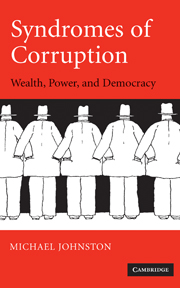Book contents
- Frontmatter
- Contents
- List of figures
- List of tables
- Preface
- 1 Wealth, power, and corruption
- 2 The international setting: power, consensus, and policy
- 3 Participation, institutions, and syndromes of corruption
- 4 Influence Markets: influence for rent, decisions for sale
- 5 Elite Cartels: how to buy friends and govern people
- 6 Oligarchs and Clans: we are family – and you're not
- 7 Official Moguls: reach out and squeeze someone
- 8 From analysis to reform
- Appendix A Countries in each cluster and distances from statistical cluster centers
- Appendix B Statistical indicators for country clusters
- References
- Index
1 - Wealth, power, and corruption
Published online by Cambridge University Press: 22 September 2009
- Frontmatter
- Contents
- List of figures
- List of tables
- Preface
- 1 Wealth, power, and corruption
- 2 The international setting: power, consensus, and policy
- 3 Participation, institutions, and syndromes of corruption
- 4 Influence Markets: influence for rent, decisions for sale
- 5 Elite Cartels: how to buy friends and govern people
- 6 Oligarchs and Clans: we are family – and you're not
- 7 Official Moguls: reach out and squeeze someone
- 8 From analysis to reform
- Appendix A Countries in each cluster and distances from statistical cluster centers
- Appendix B Statistical indicators for country clusters
- References
- Index
Summary
Three questions
Two decades of liberalization of politics and markets, and of increasingly rapid movement of people, capital, and information across regions and around the globe, have reshaped societies in all parts of the world – in many ways for the better. But these developments have been accompanied by renewed worries about corruption. New opportunities to pursue wealth and power abound, but so do new ways to use and exchange them illicitly, and to move the proceeds across borders almost instantaneously. Corruption benefits the few at the expense of the many; it delays and distorts economic development, preempts basic rights and due process, and diverts resources from basic services, international aid, and whole economies. Particularly where state institutions are weak it is often linked to violence. In part because of corruption, for millions “democracy” means increased insecurity and “free markets” are where the rich seem to get richer at the expense of everyone else.
These problems raise fundamental questions about the ways people pursue and exchange wealth and power, and about the ways societies and their economies are governed. For a generation now we have delegated major questions of justice, accountability, and reform to markets, or have tried to reduce politics and government to market-like processes. Social and state institutional frameworks essential both to sustaining democracy and markets, and to checking their excesses, have been deemphasized or defined as problems to be solved by further liberalization.
- Type
- Chapter
- Information
- Syndromes of CorruptionWealth, Power, and Democracy, pp. 1 - 15Publisher: Cambridge University PressPrint publication year: 2005



